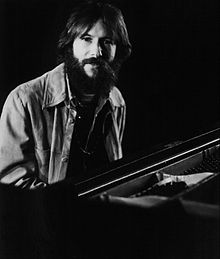Corky Siegel
Corky Siegel | |
|---|---|
 Siegel in 1975. | |
| Background information | |
| Birth name | Mark Paul Siegel |
| Born | October 24, 1943 |
| Origin | Chicago, Illinois, United States |
| Genres | Blues, third stream, classical crossover |
| Occupation(s) | Musician, composer |
| Instruments | Harmonica, piano |
| Years active | 1964–present |
| Associated acts | Siegel-Schwall Band |
| Website | www.corkymusic.com |
Mark Paul "Corky" Siegel (born October 24, 1943) is an American musician, singer-songwriter, and composer. He plays harmonica and piano. He plays and writes blues and blues-rock music, and has also worked extensively on combining blues and classical music. He is best known as the co-leader of the Siegel-Schwall Band, and as the leader of the group.[1][2][3]
Musical career[]
Corky Siegel's professional music career began in 1964, when he met guitarist Jim Schwall. Both were studying music at Roosevelt University in Chicago. The two became a duo, performing blues music. They landed a regular gig at Pepper's Lounge, where well known, established blues musicians such as Muddy Waters, Howlin' Wolf, and Willie Dixon would often sit in.[4] After a while the duo became a quartet, the Siegel-Schwall Band.
The Siegel-Schwall Band enjoyed increasing popularity, and by 1967 were touring nationally, playing at large rock venues like the Fillmore West and sharing the bill with famous rock bands.[5][6] Between 1966 and 1974, they released ten albums. After 1974, they stopped playing concerts, but the band re-formed in 1987. They released two albums of new material.[7] Until "Siegel-Schwall lovingly disbanded" in March 2016, they still played occasional live dates and featured drummer Sam Lay and bassist ; Lay played with Siegel in the of 1973 which also featured Chicago blues guitarist .[8]
The idea of combining blues and classical music was first suggested by classical conductor Seiji Ozawa. Ozawa brought together the Siegel-Schwall Band and the Chicago Symphony Orchestra. They first performed "Three Pieces for Blues Band and Symphony Orchestra", by William Russo in 1968. In 1973, the band and Ozawa released a recording of this work performed with the San Francisco Symphony. In 1975, Siegel and Ozawa, with the San Francisco Symphony, first performed another William Russo work, "Street Music: A Blues Concerto". A recording of this piece was released in 1979.[9]
Inspired by his collaboration with Ozawa, Corky Siegel formed in 1988. The group's music combines elements of classical, blues, and jazz. The band consists of a string quartet – two violins, a viola, and a cello – along with percussionist , and Siegel on harmonica and also sometimes doubling on piano. As of early 2019, Chamber Blues has released four albums,[10][11][12][13][14] and still tours nationally and internationally.[15]
Siegel has also worked on numerous other musical projects. In 2004, he was a member of the Chicago Blues Reunion band, which released the album Buried Alive in the Blues.[16]
Book[]
With Peter Krammer, Corky Siegel wrote a book for musicians and music students, called Let Your Music Soar: The Emotional Connection. It was published by Nova Vista Publishing in 2007.
Discography[]
For Siegel's recordings with the Siegel-Schwall Band, see Siegel-Schwall Band.
- Corky Siegel – Corky Siegel (1974 – Dharma)
- Street Music: A Blues Concerto – San Francisco Symphony and Corky Siegel (1979 – Deutsche Grammophon)
- Out of the Blue – Corky Siegel (1980 – Stuff)
- Goodbye California - Corky Siegel (1984 – Skitzo/Frenia Records [re-release of Out of the Blue])
- Corky Siegel's Chamber Blues – Chamber Blues (1994 – Alligator)
- Complementary Colors – Chamber Blues (1998 – Gadfly)
- Solo Flight – Corky Siegel (1999 – Gadfly)
- Corky Siegel's Traveling Chamber Blues Show – Chamber Blues (2005 – Alligator)
- Buried Alive in the Blues – Chicago Blues Reunion (2005 – 33rd Street)
- Different Voices – Chamber Blues (2017 – Dawnserly)
References[]
- ^ Corky Siegel at AllMusic
- ^ Corky Siegel interview on YouTube on WTTW public television
- ^ Corky Siegel biograpny Archived December 25, 2009, at the Wayback Machine at the official Siegel-Schwall Band web site
- ^ Widen, Larry (2005). Tombstone Blues. Apple Core Publishing Group. pp. 55–60. ISBN 1-4116-4823-4.
- ^ Concert review of the Siegel-Schwall Band at the Fillmore West, Billboard, March 27, 1971, pp. 28, 44
- ^ Milano, Dean (2009). The Chicago Music Scene: 1960s and 1970s. Arcadia Publishing. p. 47. ISBN 0-7385-7729-4.
- ^ Siegel-Schwall Band at AllMusic
- ^ "Corky Siegel: The Siegel-Schwall Band". Siegel, Corky. June 13, 2017. Retrieved January 17, 2018.
- ^ "Corky Siegel's History and Tall Tales — The Symphonic Blues" Archived September 5, 2009, at the Wayback Machine, chamberblues.com
- ^ "Corky Siegel's Triple Blues Threat", National Public Radio, December 17, 2005
- ^ Bessman, Jim. "Siegel Makes Concerts Crystal Clear" Billboard, February 12, 2000, pp. 38–39
- ^ "About Chamber Blues" Archived June 30, 2010, at the Wayback Machine, chamberblues.com
- ^ "Corky Siegel: Shop". Siegel, Corky. Retrieved January 17, 2018.
- ^ "Press Release: Different Voices". Siegel, Corky. 2017. Retrieved January 1, 2019.
- ^ "Corky Siegel Concert Dates 2018 -2019". Siegel, Corky. 2018. Retrieved January 1, 2019.
- ^ Fricke, David. Buried Alive in the Blues review, Rolling Stone, November 17, 2005
External links[]
- Corky Siegel, the official website of his musical endeavors, including Chamber Blues and the Siegel-Schwall Blues Band
- 1943 births
- American blues harmonica players
- American blues pianists
- American male pianists
- Living people
- Musicians from Chicago
- Blues musicians from Illinois
- Jewish rock musicians
- 20th-century American pianists
- 21st-century American pianists
- 20th-century American male musicians
- 21st-century American male musicians
